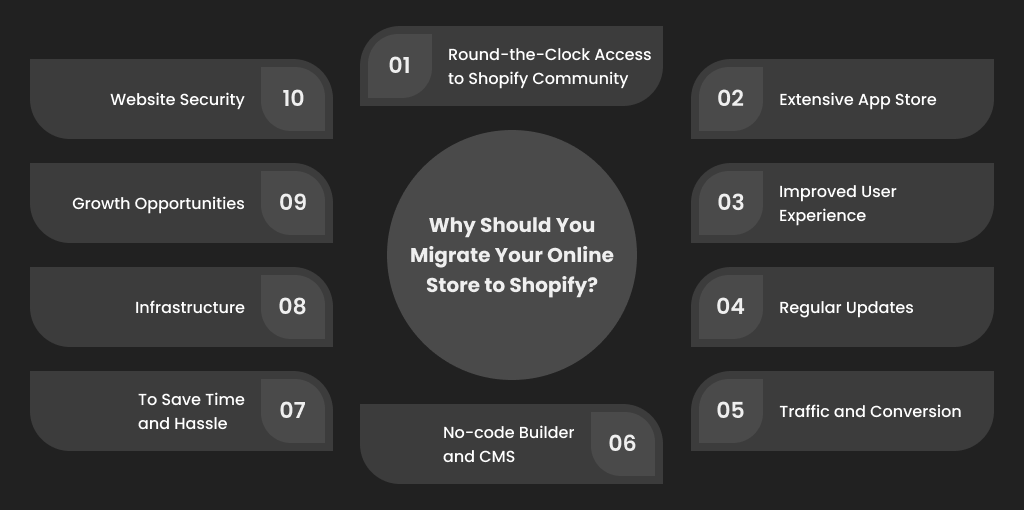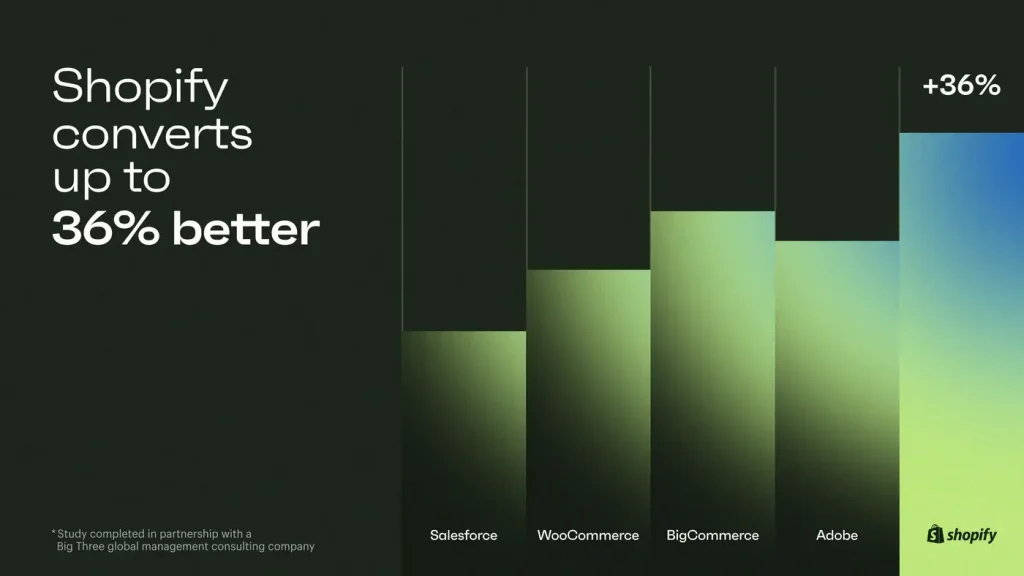Why You Should Migrate to Shopify

Website building and the nature of eCommerce keep changing. ECommerce has come so far from integrating AI-powered capabilities to adding multiple payment options and voice search features. So, deciding which eCommerce platform to use for your online store can be overwhelming.
Fortunately, Shopify is an ideal choice! It offers many customization capabilities and a user-friendly interface. It’s great for individuals and online store owners. According to WebFX, Shopify is the most popular eCommerce platform globally, with more than four million live eCommerce sites built and powered by Shopify.
Consequently, eCommerce store owners are looking for a reliable Shopify migration company to develop or migrate their existing online stores seamlessly to Shopify. In today’s piece, we are dissecting the reasons for Shopify migration, so join us as we explore how Shopify migration can improve your online store’s performance while delivering fruitful business results.
What is Shopify Migration?
Shopify migration means the process of moving an online store from one platform (be it WordPress to Shopify, Magento to Shopify, WebFlow, or BigCommerce) to Shopify. This involves moving various elements, such as customer data, products, order history, and sometimes even templates, plugins, and much more, from the old platform to Shopify.
Shopify migration seems challenging, so many eCommerce and dropshipping business owners choose to hire Shopify experts to simplify the process.
Why Should You Migrate Your Online Store to Shopify?

A turnkey solution to build a robust eCommerce store with features like customization, user-friendly interface, and swift transactions, and with 30% of online store owners choosing Shopify over other platforms, it indeed holds a key position in the eCommerce fraternity.
Let’s start this roller-coaster ride to understand why migrating to Shopify is relevant in 2026 and beyond.
1. Round-the-Clock Access to Shopify Community
Every business owner can’t know how to install and run the Shopify platform, and perhaps they are clueless about marketing and other enhanced plugging integrations. Therefore, Shopify’s online community is solid and can be found on its official blog platform, GitHub, and Slack.
These and other dedicated communities help entrepreneurs seek advice related to enhancing their online store for increased sales and better performance. Based on the research and reviews, Shopify scores well over other eCommerce platforms when it comes to support and community.
Whereas Drupal requires a lot more technical knowledge. It’s like comparing your toy car to a race car; one is easy to handle and requires constant fine-tuning.
If you’re considering making the switch, our Drupal to Shopify Migration Detailed Guide outlines the entire process step by step, ensuring a smooth transition without compromising your data or design.
With Shopify’s user-friendly tools and exceptional community support, it’s no surprise that many businesses choose it over Drupal to simplify operations and boost performance.
2. Extensive App Store
But with so many alternatives available, it’s crucial to avoid going overboard with app integration just for the fun of it. Even though Shopify apps can give you a wealth of information about your company, having too many of them can start to affect speed by making your site load more slowly. This is a surefire method to reduce revenue and conversions.
You can hire an experienced Shopify development company to get professional guidance on what Shopify apps can do for your online store.
Reach Out Today, and Discover How Shopify Can Elevate Your Store
3. Improved User Experience
The chance to build an online store with a better customer experience is one advantage of moving your eCommerce store to Shopify. You can accomplish this by redesigning your website.
To provide your consumers with a better online experience, you might want to incorporate new features (like a wishlist button or a section for customer feedback) or redesign your online store’s look.
If you’re considering a platform change but aren’t sure where to start, our comprehensive guide on eCommerce Platform Migration explains the entire process, helping you make an informed decision and ensure a seamless transition.
For example, you should move your business to a different platform if your present eCommerce website has an outdated design and a cluttered layout. In this manner, a company may build a cutting-edge, user-friendly online store that will assist in increasing sales and consumer engagement.
4. Regular Updates
Shopify introduces new features and updates regularly. For instance, in the previous year, they announced more than two hundred updates for store owners in the Winter and Summer seasons. The list of new features includes the following:
- A new-page checkout
- Checkout customization
- Shopify Credit Business Card
- B2B sales kit
- Top-notch mobile strategy
While powerful, Drupal requires more effort when scaling and managing high-traffic stores.
5. Traffic and Conversion
Shopify boasts the most remarkable checkout conversion rate on the internet, outperforming rivals by up to 36% and 15% on average. Shopify’s vast identity network, unmatched scalability, customer trust, and ongoing innovation are all responsible for this outstanding achievement.

Source: Shopify
Such significant increases in conversion rates might significantly impact your business’s yearly revenue. With 125,000 monthly visits, an average order value of $100, and a conversion rate of 0.92%, for example, a 0.5% increase in conversion rate would boost your monthly revenue by $62,500, bringing your annual income to $690,000. Your Gross Merchandise Value (GMV) can be significantly increased by increasing revenue and conversion rates.
6. No-code Builder and CMS
Anyone without coding experience can quickly start and run an online store with Shopify’s integrated CMS and no-code builder. With the use of the platform’s integrated content management system (CMS), online shops may easily maintain a blog by modifying its headers, typeface, links, and images. However, in order to perform this feature on Magento at the same level, third-party extensions are likely required.
Although Shopify offers HTML and CSS editing, you don’t need to know how to code to utilize it because it’s a no-code builder. With the help of a large staff of Shopify Experts, over 6,000 apps, and convenient drag-and-drop capabilities, merchants can easily set up and configure their stores. Without expert assistance, third-party extensions, or coding knowledge, using Magento is nearly difficult.
This is one of the top reasons why online store owners with no coding or technical skills migrate from other online platforms to Shopify.
7. To Save Time and Hassle
It is said that doing a store migration yourself saves money, time, and hassle, but in reality, not outsourcing Shopify experts means the opposite!
Imagine how many hours this would take you:
- Search the internet for how-to guides
- Go through and learn the process
- Migrate your store
- Configure miscellaneous settings related to template, email, and so on
- Find bugs and fix them
You’ve squandered not only your time but also your money. Therefore, it is best to hire Shopify developers from a renowned business to get the project done in a few days.
Furthermore, a professional Shopify migration solution works efficiently and keeps your site operational with little or no downtime. Your job is to expand your business, not to become a Shopify expert. Attempting a site migration consumes too much of your time and causes several complications. Therefore, it is advisable to outsource the website migration.
8. Infrastructure
As a forward-thinking platform, Shopify maintains an autonomous and fully functional eCommerce infrastructure. It keeps tools and technology up to date with the latest advances. The corporation does not intend to let retailers handle legacy systems on their own.
Furthermore, it continues to expand its integration capabilities. More applications appear to improve retail management and consumer experience.
Hence, Shopify sounds like a platform that is too good to go.
9. Growth Opportunities
An online store that is not properly built to handle rising traffic poses a significant danger to a company’s growth potential. In the case of excessive traffic, it crashes, resulting in sales losses and damage to the brand’s reputation.
Migrating your existing store to Shopify boosts your chances of maintaining these prospects. This eCommerce platform’s scalable architecture allows it to withstand high volumes of traffic without crashing. Moreover, many popular websites built with Shopify demonstrate the platform’s ability to support high-traffic brands, proving its reliability and scalability.
10. Website Security
In today’s eCommerce era, each business must prioritize security. Protecting your company, website, and consumer information from cyber threats is not optional.
The headlines usually feature large firms like Target and Amazon, but there’s often more to it. Almost half of all cyberattacks target small and medium-sized enterprises, with one-third focusing on online stores.
Shopify integrates security more firmly into the system.
All Shopify-based sites and stores have an SSL certificate, and the platform’s security level meets all six PCI standard areas. In layperson’s terms, this means that your store (and its host) will be as safe and secure as possible with regard to client information.
Work with WebyKing’s Shopify Experts and Migrate to Shopify
Manual migration is cumbersome and prone to errors that even result in important data losses. Therefore, we help you with Shopify migration services to help you easily move your online store from any platform to Shopify. Our team of experienced and skilled Shopify developers follows standard steps to ensure seamless migration.
We set up the project and performed the data backup after thoroughly understanding your requirements. Based on this, our eCommerce web developers will transfer your existing online business to Shopify and test it thoroughly.
Following the migration procedure, our team will assist you with any technical issues with your Shopify store. We have a track record of aiding various organizations in a wide range of areas and demands. Our team possesses the requisite knowledge and experience, which can be a game changer in Shopify development.
Are you willing to migrate your eCommerce store to Shopify? Talk to our experts now and anticipate the growth opportunities this migration brings to your table.
Whether you’re upgrading technology, improving performance, or rebranding your business, this checklist ensures a smooth and successful migration every step of the way. Get Your Free Checklist Now!

Frequently Asked Questions on Shopify Migration
Is migrating to Shopify a challenging process?
Not really. Shopify offers an extensive range of guides and tutorials to ease the migration process. Hence, the ideal way is to opt for an experienced Shopify development company to get things done.
Why migrate to Shopify?
Shopify is a popular eCommerce platform that offers customization capabilities, a user-friendly platform, integrations, SEO plugins, scalability options, security features, and much more to enhance your store’s performance.
Can I keep my domain name the same when migrating to Shopify?
Yes, you can retain your existing website domain name when migrating to Shopify. However, you need to update your domain settings to point to your new Shopify hosting provider. This process involves changing the DNS (Domain Name System) records.
Ravi Makhija, the visionary Founder and CEO of WebyKing, is a seasoned digital marketing strategist and web technology expert with over a decade of experience. Under his leadership, WebyKing has evolved into a premier full service web and marketing agency, delivering innovative solutions that drive online success. Ravi’s deep understanding of the digital landscape combined with his passion for cutting-edge technologies empowers him to consistently exceed client expectations and deliver results that matter.

















